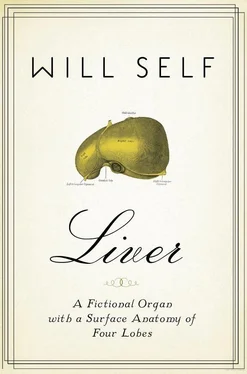Vreni Stauben, Ueli Weiss and even Marianne Kreutzer — they all knelt down, seemingly unselfconscious, in front of the shrine; bowing their heads before the schoolgirl’s bibelots, hair ribbons and dag-tails of macramé. Reiter darted a sharp look at Joyce: a schoolmasterly prohibition on giggling or fidgeting. Then he began chanting, low and clear, in Latin, while the trio made the appropriate responses, ‘ Credo in Deum Patrem. Et in Jesum Christum. Credo in Spiritum Sanctum . ’
A flat of her own would involve Joyce in her newly adoptive city, allow her to become part of it — then she pulled herself up short. This was ridiculous! I’m terminally ill! Quid sum miser tunc dicturus, Quem patronum togaturus, Cum vix justus sit securus? What then shall I say, wretch that I am? What advocate entreats to speak for me? The righteous Swiss had Monsignor Reiter, his purple sash glowing in the gloomy bedroom, with its nightlights wavering in their faithful exhalations. Reiter had said the Church could not sanction Saint Gertrud’s growing cult — yet here he was, tending its shoots.
If it hadn’t been for the curiosity, awakened in Joyce by the cynical Marianne Kreutzer’s incongruous piety, she might have headed back to her own house — but then it could never again be a home, not now; the final washing up had been done, and her underwear itemized for alms. Might have, even so — but then there was that dreadful fear of flying, and the insufferable burden that was Isobel. Might have — but then there was Switzerland itself, its reassuring orderliness, its stolid vitality.
Easter came and then went. Joyce attended the children’s passion play that Vreni Stauben put on at St Anton’s. It seemed no different to such productions in Middle England: the same halting declamations and belted-out song, the same painted faces and haphazard gowns. The narrative — which linked environmental concerns to the Resurrection — had innocent new flowers sprouting on Gr ü n-donnerstag , only for them to be scythed down on Karfreitag , as the Saviour was nailed up. Joyce found the play’s spirituality as flabby as anything Anglicans might have originated.
She told herself she went out of simple loyalty; that the week she had stayed at Universitatstrasse had created a bond between her and Vreni Stauben, shared domesticity being more adhesive than any mumbo-jumbo , no matter how ancient or hallowed. The truth was that Joyce was lonely — achingly so.
The heft of the diocese had secured her a flat in a small block on Saatlenstrasse, in the suburb of Oerlikon, which lay beyond the wooded hump of the Zürichberg. With her refugee status under consideration and a temporary residence permit granted, Joyce was freed from the exposure of repeated interviews with Frau Mannle, the Fremdenpolizei officer who held her dossier.
Her pension income continued to be deposited in her bank account; the running costs of the old family home were handled by direct debit. A small sum was also being discreetly paid into a Swiss bank account, so that for her Zürich rent and her nugatory expenses Joyce could simply withdraw money from a cashpoint. Any questions of taxation might, an adviser at the lawyers’ office told her, be postponed until her residency had been placed on a more permanent footing.
Joyce felt sorry for the solid, inter-war, Bournville semi, the tidy rooms growing mustier as spring quickened the world without: fluffing up the privet, greening the lawn, switching on the bulbs — white, then yellow, then red, violet and orange — in the brown beds. Yet this close dormancy seemed in equipoise with her new Oerlikon apartment.
She had welcomed the stripped-down state of the four small rooms. Light fittings, blinds, carpets, kitchen appliances — all had gone with the previous tenants; this was, Ueli Weiss had told her, the Swiss way. It meant that Joyce had to make several expeditions to the Sihl City shopping centre, where she had wandered the atriums and climbed the escalators, consulted catalogues and spoken with sales assistants. She didn’t mind this, and such was the efficiency of the local service sector that the stuff was all delivered and installed within ten days.
By then, with characteristic competence, Joyce had completed her local orientation. She knew where to shop for groceries, where to buy the dockets that had to be attached to rubbish bags, and how to sort that rubbish so as to conform to the draconian recycling ordinances.
To begin with the neighbours in her three-storey block were, if not exactly friendly, pointedly welcoming. Herr Siemens, the stumpy, bearded man who lived in the flat on the other side of the landing, stopped to chat when they met on the stairs. Joyce guessed he was a computer programmer, and soon enough he confirmed this. He was middle aged, probably obsessive , yet altogether gentle and decent , she thought. In the evenings he played electronic music, and, although the beeps and oscillations were hardly raucous, Herr Siemens came across punctiliously, every two or three days, to confirm that his neighbour still did not object.
It was the same with the Pfeiffers, who lived in the flat below. Their two children, Rolf and Astrid, were no noisier than any other under-fives Joyce had been exposed to — if anything, markedly less so — yet Frau Pfeiffer came up regularly to ask if they were disturbing Joyce. She was a jolly, sloppy, young woman, with uncorseted breasts hanging loose in her cardigan; but, however slatternly Frau Pfeiffer may have been, she was always perfectly correct: polite and distant. Her counterpart in Birmingham would, Joyce felt sure, have been tattooed, pierced and offhandedly abusive — for Oerlikon was a predominantly working-class area, convenient for the workers at the nearby industrial estate.
When Joyce had moved in, it was Frau Pfeiffer who told her about the local shops, and directed her to the Peter Tea Room, as a place where an Englishwoman might get a cup of her national beverage. The mannish hair-do that Joyce had had chemically induced was becoming unruly, and, once again, it was Frau Pfeiffer who recommended a salon. But that was as far as it went — no further intimacy was encouraged. She was not alone in this: Herr Siemens was the same, as was the landlord, Herr Frech, who collected the rent in person. All of them remained standing some way off, a people at once fleshily corporeal and nevertheless exiguous: ein verschlossenes Volk — a hidden-away people — as the Swiss said of themselves.
The language barrier didn’t help, although Joyce felt little inclination to surmount it. Her old evening-class German carried her only so far into the impenetrable accent; it was almost impossible to feel out the syntax lying beneath the slushy Schweizerdeutsch. Besides, she feared that the lack of nuance she experienced conversing with these people in a collage of languages — a little English, ein bisschen German, sometimes a soupçon of French — would remain, even if their meaning became as pellucid as the windows of their spick and span homes.
Joyce went for strolls along the railway line where allotment sheds comfortingly clustered, then followed the path that ran beside the River Glatt. Apart from the shallower pitch of the roofs on the boxy dwellings, and the precision of the spray-painted graffiti on the concrete bridges, these could have been dull promenades through the under-imagined outskirts of any small English city.
Or else Joyce turned the other way out of her block and went to the Peter, to sit in its cosy uglification of melamine tables and gingham curtains, watching the slow explosions of cigarette smoke from the ruined mouths of other elderly patrons. After this, telling herself — but for why? — that she ought to work off the Apfelstrudel and the squirty cream, Joyce would plunge uphill on the switchback trails that led to the top of the Zürichberg. Spring sunshine groped the evergloomy limbs of spruce and pine. The blackened trunks of their predecessors, done for by decay, lay tossed into gulleys. The toadstools were white warts on their flayed trunks, the atmosphere was rich with the odour of rotting bark.
Читать дальше












